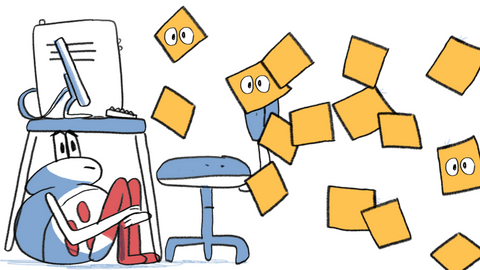I love the idea of getting organised. When my desk is tidy, my week is all mapped out and I have a fresh notebook and Sharpie ready for action. I feel excited about the week ahead.
All too often though, by the end of the week, my notebook was full of illegible notes. I had twice as many meetings as I’d planned and I didn’t have any focused time to do the work I needed to.
Sounds familiar? Well, perhaps time blocking can help.
What is time blocking?
Time blocking is the act of putting time into your calendar to complete specific tasks. For example “writing up research findings” or a group of similar tasks “respond to all emails” or at least I thought it was.
There is a lot of evidence to suggest the human mind doesn’t cope well with switching contexts. Which has helped to popularise time blocking. Instead of trying to reply to an email whilst doing a bit of design work all within a meeting. We perform better with a clear focus on singular tasks.
Time blocking that doesn’t work
When I started playing around with time blocking it just didn’t work for me at all. I’d put in time for tasks like “create wireframe”, “design home page”, and “watch usability testing videos”. Inevitably I’d overestimate what I could do and would fail to complete the tasks.
I’d then be left to shift my calendar around to compensate. I felt like I was spending more time trying to fit work into my calendar than I was doing it.
I abandoned blocking out time completely. Instead, if I needed to get something done I’d start work at 6am and get an hour or two in before the work day began. I intended to finish work early but more often than not that didn’t happen.
Doing all this extra work just wasn’t sustainable in the long run, but as a short term fix it helped me get through my workload.
Changing my perception
I’d dismissed time blocking as a productivity hack for some time. Until in 2017 when I came across Dan Mall’s musings on calendar management.
Dan had organised his time by blocks named “Mission Work”, “Flow Time”, “Meeting Slot” and such. His calendar was based on his own productivity levels and broader grouped types of working. Inspired by Jocelyn K. Glei’s book Unsubscribe. He’d start his day with his most meaningful work, which Jocelyn describes as “work that contributes to your legacy, helps you advance your career, expands your skill set, etc.… When you finish such work, you have the satisfying feeling of time well spent and a job well done.”.
In an instant I was hooked, I needed to revisit time blocking and read Jocelyn’s book.
Giving time blocking another go
I began with 2 questions;
- When am I most productive?
- What stops me from time blocking?
1. When am I most productive?
I’m much better at writing proposals and doing strategic work first thing in the day. Meetings really do take it out of me, I find it hard to get back into focused work after meetings. Could I just do all my meetings in the afternoon?
2. What stops me from time blocking?
Here are the top 3 things that stop me from blocking out my time:
1. Distractions
In the 1930s psychologist Burrhus Frederic Skinner experimented with rewarding food pellets to rats for pressing a button. When the rats were rewarded food for pressing the button a fixed number of 200 times they lost interest overtime. However when the amount of times the button needed to be pressed changed randomly each time for example from 50 to 300 to 200, the rats continued to press the button, they were addicted. Applying this theory to emails and instant messaging, you never know when your next message is going to come saying how amazing you are (this never happens by the way). The average knowledge worker checks their email 54 times a day, surely I could reduce this?
2. Meetings
There is a lot of research to say people spend at least 50% of their time in meetings. Just 50%? I think I was at 90% at the time. A lot of meetings didn’t have an agenda or purpose. Did I need to be in all these meetings.
3. Team
The more people in a team the less rigid you can become with blocking your time. Some people won’t work Fridays, or will need to do the school run on Tuesdays and Thursdays etc.. The person is more important than the work, this stuff is non-negotiable. How can we fit our own working preferences with everyone else's?
Putting time blocking into action
Always start with what is in your control and focus on your needs. I began working condensed hours Monday to Thursday. This allowed me to start work at around 6am when I was at my most productive.
Once I’d got my energy boost from doing the stuff I needed to do. I was then free to focus on emails and slack, rather than checking them 54 times a day, I began to do them in one batch.
I’d try to keep my meetings to the afternoon when possible. I’d group meetings like one-to-one’s to be on the same day. This helped reduce the cognitive load of context switching.
It’s not an exact science but blocking my time into these 3 segments helped me feel better and be more productive in my work:
- Focus time
- Reactive work
- Meetings
The simplicity of just 3 things is empowering. As soon as I heard the question ”When is good for you”, I could instantly reply, in the afternoon, Monday, Wednesday or Thursday. I knew without looking that my one-to-one’s were locked in on the Tuesday afternoon and my focus time and reactive work were in the mornings.
It takes time to establish patterns of time blocks, it’s common that the needs of the team are greater than the individual. Even if you gain 10% more focus time it’s worth paying attention to time blocking.
Here are 3 tactics to help you and your team to establish time blocking:
1: User manuals
User manuals are a great way of getting people’s working preferences out in the open. They are akin to an instruction manual but for humans. Write your user manual, put a link to it on your email signature and encourage others to do the same.
Start by making sure every meeting you schedule has a clear purpose and agenda. Review all your meetings in the calendar and ask for clear agendas if needed.
3. Team Circles
I’m a advocate of Jeff Bezo’s two pizza rule as the article says “A smaller team spends less time managing timetables and keeping people up to date, and more time doing what needs to be done”.
Summary
- Time blocking is tough especially if you go to the level of blocking time for specific tasks.
- Look at broader topics for work consider when you are at your most productive and prioritise to your needs
- Consider what stops you from blocking out your time. Be honest with yourself, do you really need to check your emails 54 times a day?
- Before asking people to change how they work, start with yourself. What can you do immediately to help you focus on the things you want to do? How can you make life easier for others? Add an agenda to your next meeting, or write a user manual and share it. It doesn’t need to be big.
- Over time work with your team to constantly review ways of working and team sizes, pay attention to being inclusive in meetings.









